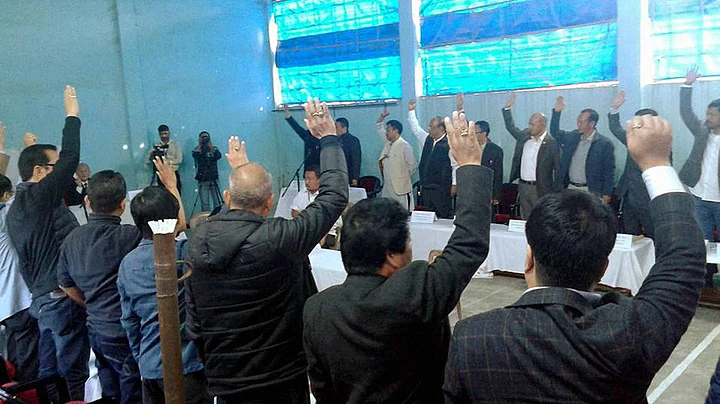As the crisis in Arunachal Pradesh deepened, the Guwahati High Court stepped in and put all decisions taken by the makeshift assembly on hold. One of the crucial decisions taken on Wednesday was to impeach the Speaker Nabam Rebia.
The impeachment lead to ruckus and violence in the assembly, following which the premises were sealed. The session on Thursday was held in the conference room of a hotel.
What Exactly Happened

- The Governor of Arunachal Pradesh, JP Rajkhowa, sent a notification advancing the State Assembly session from January 24 to December 16 this year.
- Speaker Rebia challenged the notification in court.
- Rebia was impeached on December 16. He directed the district administration to seal the Assembly.
- The Governor then gave his consent to shift the Assembly session to a hotel’s conference room.
- Following the impeachment, Deputy Speaker Tenzing Norbu Thongdok restored the membership of 14 suspended MLAs.
- Out of the 60 members of the assembly, 33 members then proceeded to elect Congressman Kalikho Pul as the new Chief Minister of the state.
- Current Chief Minister Nabam Tuki, and his 26 supporting MLAs boycotted the proceedings terming them as “illegal and unconstitutional”.
- CM Tuki has written to Prime Minister Narendra Modi for help.
Guwahati HC’s Next Step
Justice Hrishikesh Roy, hearing a writ petition filed by Speaker Nabam Rebia, put all the decisions by the make-shift assembly on hold. One such decision, apart from impeaching the Speaker was the notification sent by the Governor. The court termed it as “violation of Article 174 and 175 of the Constitution”.
The two Articles relate to sessions of the state legislature and the right of the Governor to address and send messages to the House.
The judge posted the case for next hearing on February 2, 2016.
(With inputs from PTI.)
(At The Quint, we question everything. Play an active role in shaping our journalism by becoming a member today.)
